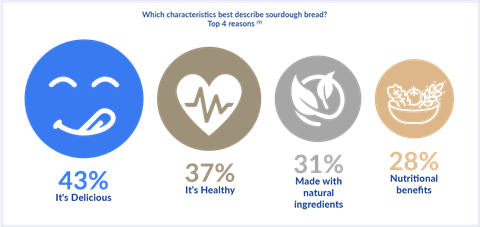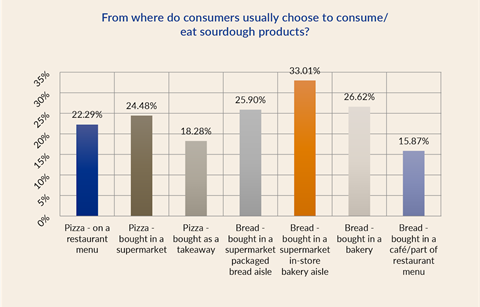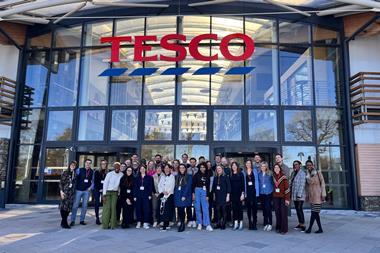Bakeries that are not already offering sourdough products could be missing an important source of revenue – as well as the opportunity to show consumers that they are in touch with current market trends, as Lesaffre explains.
That health and wellbeing have come to the forefront of consumers’ focus in the past few years is now a given.
Numerous studies have shown the increased interest health and wellbeing, with McKinsey’s Future of Wellness Survey revealing that Gen Zers and Millennials are now “purchasing more wellness products and services than older generations”.
Amid this general focus, which has come into sharper relief since the recent Covid-19 pandemic, nutrition and gut health are two aspects gaining greater recognition, with McKinsey’s report revealing that more than 80% of consumers in the UK, China and the US consider gut health to be important and over 50% anticipate making it a higher priority in the next two to three years.
As such, there has been rapid new product development in probiotic-rich foods such as kimchi and kombucha and, with the gut-brain axis now recognised as having influence on mood and cognition, consumers are increasingly looking towards foods that will positively influence the microbiome in the gut and have an overall positive effect on their mental as well as physical health.
In terms of bakery, one product that has long been viewed as ‘healthier’ in the minds of consumers – and has gained traction as a result – is sourdough. As Women’s Health magazine confirmed in a recent article sourdough’s popularity “comes in part from its perception as a healthier bread”, while its simplicity – with the three traditional ingredients of flour, water and salt – plays into the current search for foods that are not overly processed (non-UPFs).

As the article points out, the fermentation used in making sourdough distinguishes it from many other types of bread and its digestibility and potential to enhance probiotic health have made it a popular choice among shoppers in recent years.
In addition, sourdough is generally considered a tasty and versatile bread, lending itself easily to a wide variety of occasions and usages.
Research reveals how consumers view sourdough
Delving deeper into consumer insights on sourdough, bakery company Lesaffre UK & Ireland, in partnership with Campden BRI and research firm Vypr, has produced an in-depth study that shows how widespread sourdough has become – and the elements that contribute to its ongoing popularity. Through detailed analysis of consumer purchase frequency, consumption channels, motivations for choosing sourdough bread, barriers to purchase and specific product preferences, the initial phase of the study, in collaboration with Vypr, indicates why and how sourdough bread has become mainstream in the retail environment. Meanwhile, the second and third phases of the report, in collaboration with Campden BRI, focus on sensory profiling, consumer liking evaluations and purchase intent assessments.
Top-level findings from the report indicate that 68% of respondents purchase sourdough bakery products, with 32% buying them frequently. Within that cohort, 56% claim that their consumption of sourdough products has remained stable over the past 12 months, while 34% reported increasing sourdough consumption during that time.
Importantly for the future of sourdough, within the group increasing consumption, the trend is most evident among those aged 25-34 and households with an income of £67k or more. One respondent, answering a query on why they buy sourdough rather than other breads, replied that it was “generally healthy for your gut, tastes better, is a bit more expensive but I’m prepared to pay the extra”.
Freshly baked sourdough bread was indicated as a strong consumer preference, with a fifth of those surveyed buying it from the wrapped bread aisle in a supermarket or an independent artisan baker.
The study goes further into consumption occasions and the reasons for choosing sourdough bread, with taste (43%), healthiness (37%).and natural ingredients (31%) leading the field. Nutritional advantages (28%) follow closely behind, so it’s easy to see how sourdough fits into the current zeitgeist, particularly among the younger generation.

“This study on sourdough bread consumption in the UK is crucial for understanding the recent resurgence in its popularity and to provide comprehensive insights into consumer preferences, purchase habits, and sensory profiles,” says Jorge Semiao, marketer at the company. “By combining expert panel assessments and extensive online consumer research, the study provides valuable data that can inform product development strategies.”
Lesaffre’s research also takes a deep dive into barriers to purchasing sourdough, purchasing frequency and behaviours, as well as consumer preferences for different sourdough bakery products, so its key findings provide a solid basis as to why bakers should consider including sourdough bread (at the very least) in their bakery offering.

Moreover, sensory assessments in the report outline the characteristics – including crumb and crust odour, flavour and aftertaste – that make for successful sourdough products. This results in preference mapping for the ideal sourdough bread and key takeaways that show marginally stronger dough, wheat and sweet notes compared to least-liked samples.
How Lesaffre can help
With over 170 years of expertise in fermentation, Lesaffre offers bakers a range of sourdough products tailored to their needs, including its Livendo sourdough brand available in liquid, paste, and powder forms, which can be cultivated and refreshed by bakers or employed as a ready-to-use starter culture. Meanwhile, its fermentation skills, scientific and technological expertise, and collaboration with bakers aim to reveal the magic of nature and provide the most appropriate response to suit different bakeries’ customers.
The Lesaffre team works closely with bakers to develop sourdough solutions that balance yeast and bacteria interactions for optimal results, and its Baking Center™ experts analyse consumer preferences to refine bakers’ sourdough offerings and ensure high-quality and consistent performance. Products include its Livendo F100 Devitalised Wheat Sourdough, with provides a sourdough flavour and pronounced colour to what bread varieties, for example, while its Livendo LVBD3000 Durum Wheat Live Sourdough infuses delicate hazelnut and milky notes into bread batches of any scale.
To find out more about Lesaffre’s sourdough solutions, go to www.lesaffre.uk or contact 01905 755 811.



































